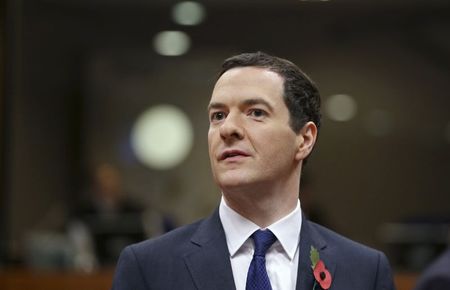By Kylie MacLellan
LONDON (Reuters) - Stagnation in the euro zone, recession in Japan and geopolitical crises have increased concerns about the state of the global economy, British finance minister George Osborne said on Friday.
Osborne said economic performance in the euro zone was a cause of "real worry and concern", particularly in Britain whose main export markets are in the bloc.
"There is definitely more concern around about the state of the global economy than there was a few months ago, you see that not just when you talk about Europe," he told an audience of business leaders in London.
"Japan has gone into recession and there are all the geopolitical risks out there."
Earlier this week, British Prime Minister David Cameron said "red warning lights" were flashing over the state of the global economy. Britain's opposition Labour party said he was "making excuses" for a slowdown in Britain's growth rate ahead of national elections in May.
Speaking at the same event as Osborne, Italian Economy Minister Pier Carlo Padoan said he was confident that monetary policy was being used to do "whatever it can" in the euro area to support the recovery and move the inflation rate towards its target.
Padoan said progressive integration within the European Union had been a key driver of growth and jobs over the last decade and plans for a capital markets union would help continue this.
The EU's new financial services chief has said he wants to create an integrated market for raising money through bonds, shares and other financial instruments over the next five years and will set out his plans by the middle of next year.
Channelling more money into small companies is seen as crucial for Europe's efforts to boost its fragile economy because small and medium-sized enterprises provide two out of every three private-sector jobs in the EU.
"What we need to do is to take decisive action towards further integration of capital markets which are an essential instrument for growth," Padoan said.
Osborne said there had been "a marked improvement" in financial and credit conditions in Britain but more needed to be done, particularly for small and medium-sized businesses. Europe as a whole was still too dependent on bank credit as source of finance for businesses, he said.

"There is a real opportunity," he said of plans for capital market union. "Let's not turn this into a bureaucratic exercise or an empire-building exercise in the European Union, let's turn it into a growth-promoting exercise to support the expansion of businesses."
(Editing by Stephen Addison)